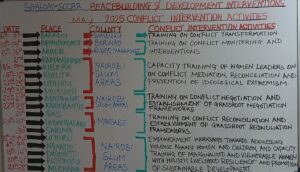By Vivian Adhiambo, MA Candidate.
Shalom-SCCRR’s Problem Solving Approach Continues Development Collaboration among Former Arch-Adversaries; An Account of the Developing Positive Peace between the Turkana and Samburu Tribes from the Parkati and Tuum locations.
For a number of years the Shalom Center for Conflict Resolution and Reconciliation (SCCRR) has been steadily reinforcing the conflict resolution skills and peacebuilding capacities of communities from Tuum (Samburu Community) and Parkati (Turkana Community). With its firm grounding on the empirical research whose focus was on the underlying causes of conflict between the Turkana and Samburu, this intervention exposed the influential community opinion shapers into the broad spectrum of the various peacebuilding techniques. Furthermore, development of educational facilities and establishment of the peace culture among the diversity of learners were critical pillars of the intervention that had a very comprehensive outreach to local stakeholders. These capacity strengthening engagements culminated in joint problem solving workshops whose ultimate goal was to attain a long-term culture of positive peace where both communities express mutual concern for the wellbeing, security and development of each other.
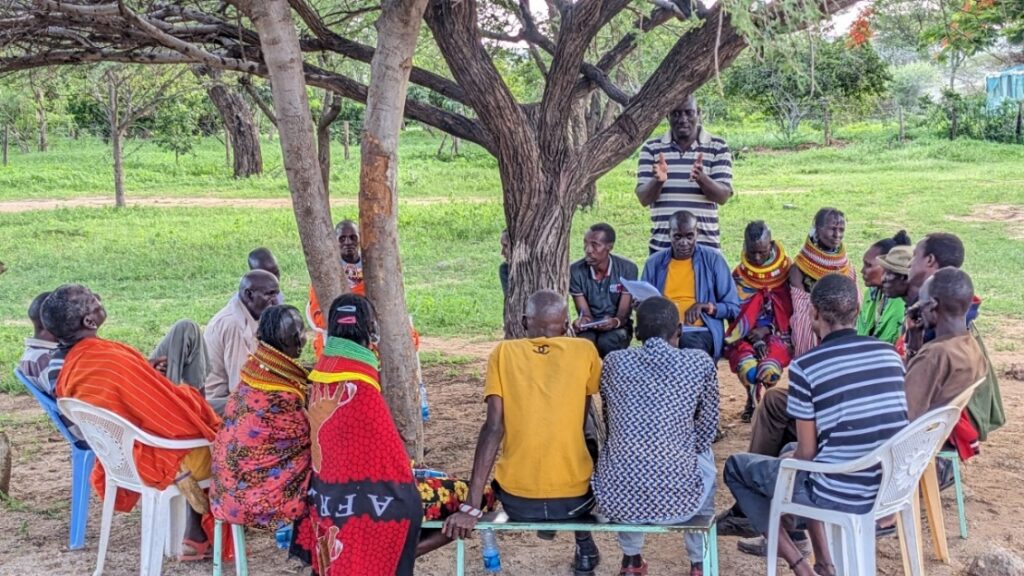
The 5-Phase Problem-Solving Workshops have been conducted with the participation of community resource persons (influential opinion shapers) from both the Turkana and Samburu communities who have suffered greatly from this conflict for ages.

Phase 1 gave both communities the opportunity to express conflict-cycle issues while also identifying the needs, interests, fears and aspirations of both within the conflict environment context. Phase 2 enabled them to further recognize and appreciate the needs, interests, fears and concerns of the other while jointly identifying the priority issues that unfortunately enable the persistence of some conflict incidences between communities residing in Tuum and Parkati.

Phase 3, empowered the resource persons to identify and agree on four main conflict issues that bear the greatest effect on the community’s well-being. The issues prioritized were; criminal activities, persistent revenge, competition over local natural resources and negative ethnic stereotyping which shaped up the frame of activities that the communities chose to effect change. Phase 4 has provided the opportunity for joint implementation of the plans established in phase 3 while also providing space for the influential opinion shapers to monitor the progress.
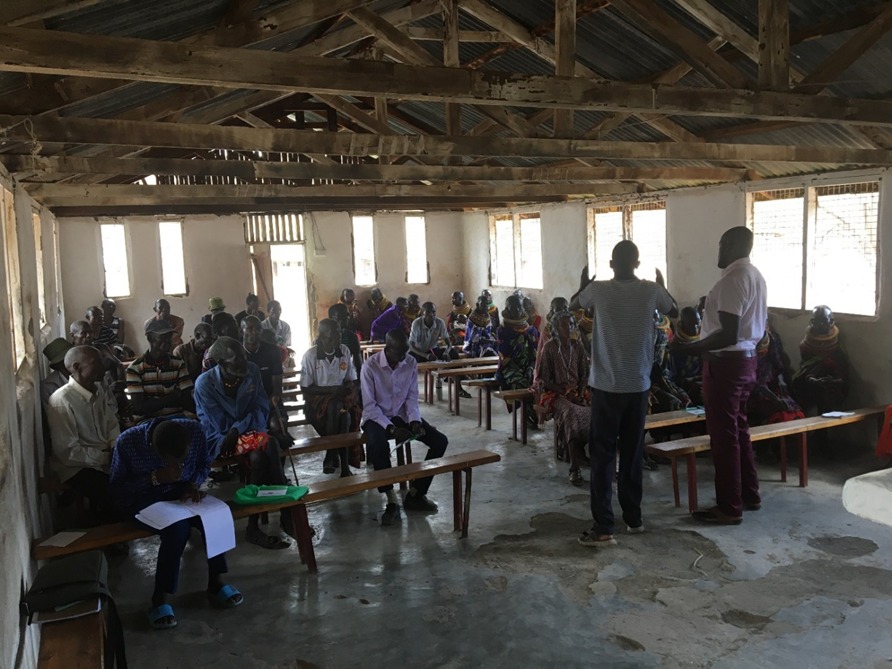
The problem solving initiative has not only managed to equip the affected communities with skills and techniques of peacebuilding but also entrenched inter-communal trust and a constructive working relationship leading to the opening up of trade, operability of service-based institutions and improving development in its entirety. These joint workshops are some of the many other indicators of change for the community, given the eventual willingness to cooperate despite the myriad obstacles that came across their way. The main objective of engaging in Problem Solving Workshops has been to further transform the adversarial attitudes and behaviors and to support the communities in jointly defining the problem associated with the persistence of conflict among them. Ultimately, the initiative is geared towards instituting healthy relationships that enable joint thinking towards long term conflict resolution and establishment of joint development projects.
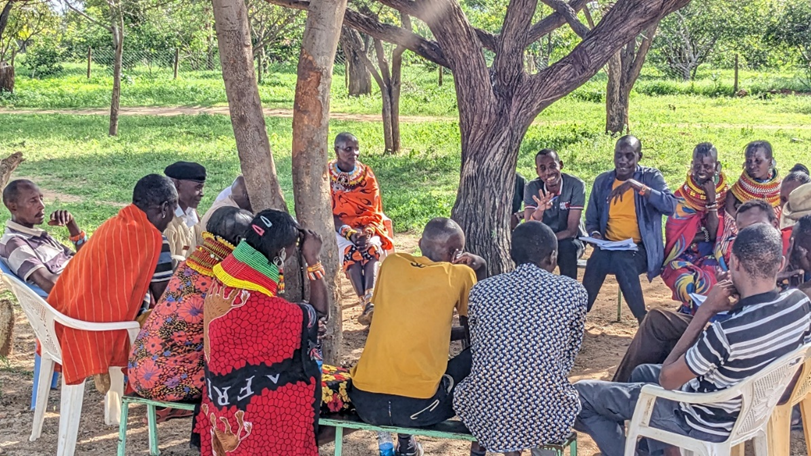
Ms. Agnes Lesilila, the Community Animator from Tuum supports the gains from the workshops stating; “Since Shalom’s conflict transformation and peacebuilding initiatives started here, the region has been able to achieve some sense of order and a lot of positive changes are being witnessed, for example, inter-ethnic communities are now able to mingle and carry out business activities together and children are now able to access schools as a result of Shalom’s numerous strategic educational/infrastructural developments in schools.”
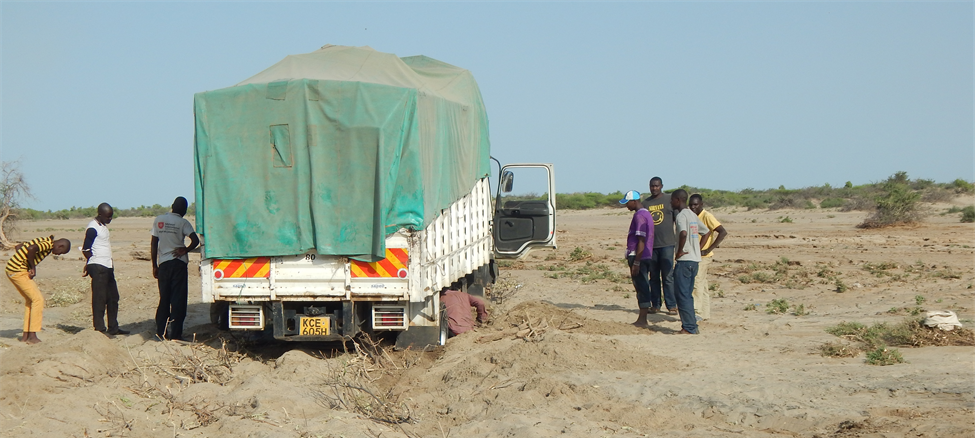
The implementation of activities generated from the collaboration have enabled the communities to gain commitment and optimism. The local communities continue to appreciate Shalom- SCCRR’s work in Samburu County, having journeyed progressively with them and having gotten them into a space where they can attest that they are on a solid path and vision to interdependent integration.
Author: Vivian Adhiambo Omondi, BA (MA Candidate), Shalom-SCCRR In-Training Capacity Program.
Relevant Links
- Shalom- SCCRR. (2023) 2009-2022 Shalom-SCCRR Results and Achievements.https://shalomconflictcenter.org/wp-content/uploads/2023/06/13-Years-of-Shalom-SCCRR-2009-2022-SV-20230624.pdf
- Domit. P. S. (2023). Wonderful Welcome and Experience with the Shalom Center for Conflict Resolution and Reconciliation (SCCRR). https://shalomconflictcenter.org/wonderful-welcome-and-experience-with-the-shalom-center-for-conflict-resolution-and-reconciliation-sccrr/
- Devine, P. R. (2023). Shalom-SCCRR Chairman’s Report on Progress and Achievements in 2022. https://shalomconflictcenter.org/chairmans-report-on-progress-and-achievements-in-2022/
- Shalom-SCCRR (2023). 2022 Shalom-SCCRR Results and Achievements. https://shalomconflictcenter.org/2022-shalom-sccrr-results-and-achievements-2/
- Shalom-SCCRR. (2023). Shalom-SCCRR 2022 Conflict Transformation and Peacebuilding Results & Achievements. https://shalomconflictcenter.org/2022-shalom-sccrr-conflict-transformation-peacebuilding-results-and-achievements/
- Shalom-SCCRR. (2023). 2022 Shalom-SCCRR School/ Educational Development Projects Results and Achievements. https://shalomconflictcenter.org/2022-shalom-sccrr-school-educational-development-projects-results-and-achievements/
- Okoth, G. (2023). Shalom-SCCRR Begins Interventions in Baragoi; A Hotspot Area for Inter-Ethnic Violence between the Turkana and Samburu Communities of Northern Kenya. https://shalomconflictcenter.org/shalom-sccrr-launches-in-baragoi-the-epicenter-of-inter-ethnic-violence-among-the-turkana-and-samburu-communities-of-northern-kenya/
- Prof. Wanakayi K. Omoka’s Understanding of the Philosophy and Work of Shalom-SCCRR Recollected; Augmented with 2022 Results by the Dept. of Monitoring, Evaluation, Research, and Learning (MERL). https://shalomconflictcenter.org/recalling-prof-wanakayi-k-omoka-phd-understanding-of-the-philosophy-and-work-of-shalom-sccrr-augmented-with-2022-shalom-sccrrs-achievements-and-results/
- Shalom-SCCRR. (2022). 2009-2021 Shalom-SCCRR Results and Achievements. https://shalomconflictcenter.org/2009-2021-shalom-sccrr-results-and-achievements/
- Odhiambo, K. (2020). Briefing Paper No. 9: An Analysis of Turkana-Samburu Conflict. An Assessment of Inter-Communal Cohesion. https://shalomconflictcenter.org/briefing-paper-no-9/
- Okoth, G. (2016). Samburu and Turkana Women Unite in Historic Mission to Sustain Peace in Samburu North. https://shalomconflictcenter.org/samburu-and-turkana-women-unite-in-historic-mission-to-sustain-peace-in-samburu-north/
- Moran, M. (2023). Ending conflict and promoting peace in Eastern Africa. https://www.ucanews.com/news/ending-conflict-and-promoting-peace-in-eastern-africa/101132
- Prof. Omoka. W. K and Devine, P. R. (2020). Human Rights are a Foundation of Shalom-SCCRR’s Conflict Resolution and Reconciliation Interventions. https://shalomconflictcenter.org/human-rights-are-a-foundation-of-shalom-sccrrs-conflict-resolution-and-reconciliation-interventions-2/
- Irish Minister Visits Shalom, Praises Work for Peace https://shalomconflictcenter.org/irish-minister-visits-shalom-praises-work-for-peace/
- Evidence: Shalom’s Methodology leads to Conflict Prevention and Peacebuilding Progress. https://shalomconflictcenter.org/evidence-shaloms-methodology-leads-to-conflict-prevention-and-peacebuilding-progress/
- Radicalization and Extremism in Eastern Africa: Dynamics and Drivers. https://shalomconflictcenter.org/wp-content/uploads/2021/02/Radicalisation-and-Extremism-in-Eastern-Africa-Dynamics-and-Drivers.pdf
- Fr. Patrick Devine PhD, Lecture at the National Justice & Peace Network (NJPN) Conference 2022, UK https://shalomconflictcenter.org/fr-patrick-devine-phd-lecture-at-the-national-justice-peace-network-njpn-conference-2022-uk/
- Okoth, G. (2022). Shalom-SCCRR’s Data-Driven Peacebuilding Methodology: Progress in Mainstreaming Research as the basis for Communities’ Collective Action in Conflict Transformation and Peacebuilding. https://shalomconflictcenter.org/shalom-sccrrs-data-driven-peacebuilding-methodology/
- Odhiambo, K. (2022). A Future of Safety and Hope; Shalom-SCCRR providing Security Infrastructure Support to Chumvyere Primary School.https://shalomconflictcenter.org/a-future-of-safety-and-hope-shalom-sccrr-providing-security-infrastructure-support-to-chumvyere-primary-school/
- Shalom-SCCRR. (2022). Shalom Empowerment Center (SEC) Addressing Violence against Women and Children: Concept Document. https://shalomconflictcenter.org/eastern-africa-shalom-empowerment-center-sec-addressing-violence-against-women-and-children-concept-document/
- Akedi, J., Kibe, E., & Osiro, M. (2023). Shalom-SCCRR Peace Education in violent and deprived locations: Interventions within Schools in Kenya’s Urban Informal Settlements (Slums) of Kibera, Mathare, and Kariobangi. https://shalomconflictcenter.org/shalom-sccrr-peace-education-in-violent-and-deprived-locations-interventions-within-schools-in-kenyas-urban-informal-settlements-slums-of-kibera-mathare-and-kariobangi/
- Molumby G. (2022). Resolution of conflict requires hope and research. https://www.irishpost.com/news/resolution-of-conflict-requires-hope-and-research-238003

